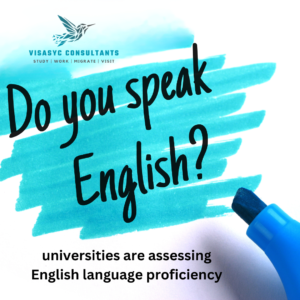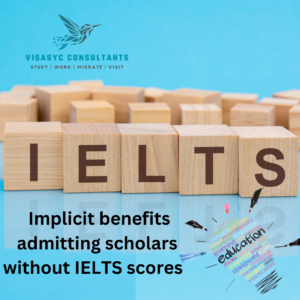UK Universities Admitting Students Without IELTS Scores
In recent times, a growing number of UK universities have begun to offer admission to scholars without taking them to have taken the IELTS test. This move by universities is salutary for scholars who do not have access to the test or find it delicate to pass. This blog post will explore the colourful UK universities that have espoused this policy and the criteria they use to assess an aspirant’s English language capability without using IELTS scores.
1 Background on IELTS conditions for transnational scholars in UK universities.
Transnational scholars looking to study at universities in the UK are frequently needed to give evidence of their English language proficiency as part of the admissions process. One common way to demonstrate this proficiency is by taking the International English Language Testing System( IELTS) test. The IELTS test assesses the four crucial language chops harkening, reading, writing, and speaking. It’s extensively honoured by universities and educational institutions around the world as a dependable index of English language proficiency.

Traditionally, UK universities have reckoned heavily on IELTS scores when considering operations from transnational scholars. These scores give a standardised dimension of a pupil’s language capacities and serve as a standard for admissions opinions. still, in recent times, a growing number of universities in the UK have started to take a different approach. They’re now admitting scholars without taking them to have taken the IELTS test.
The decision to waive the IELTS demand is grounded on several factors. originally, it acknowledges that some scholars may face walls in penetrating the test. These walls can include cost, vacuity of testing centres, and logistical challenges, especially for scholars living in remote areas. Secondly, it recognizes that English language proficiency can be demonstrated in indispensable ways. For illustration, some universities may consider an aspirant’s former academic performance in English- speaking seminaries or bear a particular interview to assess their language capacities.
By removing the IELTS demand, these universities aim to attract a wider pool of talented transnational scholars who may have been dissuaded by the test. They believe that by considering other forms of language assessment, they can more directly gauge a pupil’s English proficiency and make further inclusive admissions opinions.
2 Why some universities are now admitting scholars without IELTS scores
In recent times, a growing number of universities in the UK have made the decision to admit transnational scholars without taking them to have taken the IELTS test. This change in policy can be attributed to several factors. originally, universities fete that there are walls that help some scholars from penetrating the IELTS test. These walls can include the high cost of the test, the limited vacuity of testing centres in certain regions, and the logistical challenges that scholars may face, especially those living in remote areas.

By waiving the IELTS demand, universities are removing these walls and opening doors for talented transnational scholars who may have else been dissuaded from applying. Secondly, universities are admitting that English language proficiency can be demonstrated in indispensable ways. They understand that scholars who have attended English- speaking seminaries or have had expansive exposure to the English language through other means may retain the necessary language chops to succeed in their academic programs.
By considering an aspirant’s former academic performance in English- speaking seminaries or conducting particular interviews to assess their language capacities, universities can gain a further holistic understanding of an aspirant’s English proficiency. also, by admitting scholars without IELTS scores, universities are aiming to produce a further inclusive admissions process. They believe that counting solely on IELTS scores may not directly reflect a pupil’s true language capacities.
By considering other forms of language assessment, universities can more effectively gauge a pupil’s English proficiency and make admissions opinions that are fair and inclusive. Overall, the decision to admit scholars without IELTS scores is driven by the desire to attract a wider pool of talented transnational scholars, exclude walls to pierce, and produce a further inclusive admissions process that takes into account volition styles of demonstrating English language proficiency.
3 How universities are assessing English language proficiency in lieu of IELTS scores
With the decision to admit scholars without taking them to have taken the IELTS test, UK universities have had to come up with indispensable ways to assess English language proficiency. These universities understand that there are different paths to ignorance, and are committed to creating a fair and inclusive admissions process. So, how are universities assessing English language proficiency in lieu of IELTS scores? One system universities are using is to consider an aspirant’s former academic performance in English- speaking seminaries.

This can include grades in English language courses or completion of an English-medium class. By looking at an aspirant’s academic track record, universities can gauge their capability to understand and communicate in English effectively. Another approach is to conduct particular interviews or oral assessments to assess an aspirant’s language capacities. This can involve speaking with an admissions officer or faculty member who evaluates the aspirant’s speaking and listening chops.
These interviews can give universities a more direct sense of an aspirant’s language proficiency and allow them to ask specific questions related to their chosen field of study. In some cases, universities may also accept indispensable English language examinations similar as the Test of English as a Foreign Language( TOEFL) or the Pearson Test of English( PTE). These examinations are analogous to IELTS in assessing language chops and are honoured by numerous universities worldwide.
It’s important to note that while universities are moving down from IELTS scores, they still prioritise icing that scholars have the necessary language chops to succeed in their programs. By considering a range of indispensable assessments, universities aim to produce a further comprehensive and accurate picture of an aspirant’s English language proficiency.
Overall, the shift down from IELTS scores in the admissions process reflects universities’ commitment to diversity and inclusivity. By admitting that English language proficiency can be demonstrated in colourful ways, universities are icing that talented transnational scholars aren’t hindered by walls similar as test cost and vacuity. This opens doors for a wider range of scholars and enriches the university experience for all.
4 List of UK universities that don’t bear IELTS scores for admission

Still, do not worry! There are several UK universities that have waived the IELTS demand for admission, If you are an transnational pupil looking to study in the UK but do not have an IELTS score. This is great news for scholars who may have faced walls in penetrating the test or simply set up it delicate to pass. In this section, we’ll explore a list of UK universities that don’t bear IELTS scores for admission.
- University of Warwick The University of Warwick is one of the prestigious institutions that have espoused a more flexible approach to assessing English language proficiency. They consider an aspirant’s former academic performance and may also conduct a particular interview to estimate their language capacities.
- Queen Mary University of London Queen Mary University of London is another institution that has moved down from the reliance on IELTS scores. They assess English language proficiency through indispensable styles, similar as assessing an aspirant’s former academic performance in English- speaking seminaries.
- University of Birmingham The University of Birmingham is committed to inclusivity and has waived the IELTS demand. They assess language proficiency through a combination of styles, including interviews and reviewing an aspirant’s academic track record.
- University of Sheffield The University of Sheffield recognizes that there are multiple paths to ignorance and no longer requires IELTS scores for admission. They may consider an aspirant’s former academic performance in English- speaking seminaries or indispensable English language examinations.
- University of Southampton The University of Southampton values diversity and has excluded the need for IELTS scores.
They assess language proficiency through indispensable means, similar as particular interviews and assessing an aspirant’s former academic performance. Please note that this list isn’t total, and there may be other UK universities that don’t bear IELTS scores for admission. It’s always stylish to check with the specific university’s admissions office for the most over- to- date information. In the coming section, we will bandy the implicit benefits and downsides of admitting scholars without IELTS scores.
5 Implicit benefits and downsides of admitting scholars without IELTS scores
Admitting scholars without taking them to have taken the IELTS test has both implicit benefits and downsides for UK universities. Let’s explore these in further detail. One of the implicit benefits of waiving the IELTS demand is that it allows universities to attract a wider pool of talented transnational scholars. By removing the hedge of the IELTS test, universities can open their doors to scholars who may have been dissuaded from applying due to factors similar as cost, limited vacuity of testing centres, or logistical challenges.

This increased diversity can enrich the university experience for all scholars and produce a further inclusive literacy terrain. likewise, admitting scholars without IELTS scores allows universities to consider indispensable styles of assessing English language proficiency. By assessing an aspirant’s former academic performance in English- speaking seminaries or conducting particular interviews, universities can gain a further comprehensive understanding of an aspirant’s language capacities.
This approach recognizes that ignorance in English can be acquired through colourful paths and that standardised tests may not directly reflect a pupil’s true language chops. still, there are also implicit downsides to admitting scholars without IELTS scores. Without the standardised dimension handed by the IELTS test, universities may face challenges in comparing aspirants’ language capacities.
This can make the admissions process more private and potentially lead to inconsistencies in assessing language proficiency. also, counting on indispensable styles of language assessment may bear fresh coffers and time for universities, as they may need to conduct interviews or review expansive academic records.
Conclusion
In conclusion, the decision by UK universities to admit scholars without taking them to have taken the IELTS test is a significant step towards creating a more inclusive and different advanced education system. By removing the IELTS demand, universities are opening their doors to talented transnational scholars who may have been dissuaded by walls similar as cost, limited testing centres, or logistical challenges. This move reflects a commitment to fairness and feting that English language proficiency can be demonstrated in colourful ways.
ALSO READ : Innovative Travel Companion: Get Ready for India’s Enhanced E-Passports Rollout!
ALSO READ : Fostering Growth and Innovation: Celebrating National Small Industry Day on August 30th




